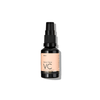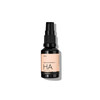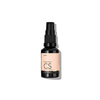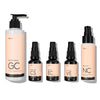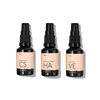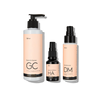Sun Safe Every Day: The Essential Reasons to Never Skip Sunscreen
In a sun-soaked environment, protecting your skin from harmful ultraviolet (UV) rays is not just advisable; it's essential. The mantra "slip, slop, slap" emphasises the need to slip on a shirt, slop on sunscreen, and slap on a hat. However, despite widespread awareness, many still neglect the crucial step of applying sunscreen daily.
Here at Fether, we're passionate about natural beauty and self-care. That includes protecting your skin, the largest organ of your body, from the sun's harmful rays. While that golden tan might look great in the short term, the long-term consequences of sun damage are significant.

This blog is your one-stop guide to understanding why sunscreen is an essential part of your daily skincare routine, not just for beach days so get ready to learn why sun safety should be a lifelong habit!
Understanding the Sun's Power
The sun might seem like a giant ball of light, but it actually emits a spectrum of rays, some invisible to the naked eye. Every moment you spend in the sun contributes to a lifetime total of skin damage, increasing the risk of developing skin issues in the future. This makes it crucial to wear sunscreen not just on sunny days, but every day, regardless of the weather, as UV rays can penetrate through clouds and even glass.
Ultraviolet (UV) radiation from the sun is categorised into two main types that are concerning for our health: UVA and UVB. UVA rays penetrate deep into the skin, leading to premature ageing and long-term skin damage. UVB rays, on the other hand, are primarily responsible for sunburn and play the most significant role in causing skin cancer. By using sunscreen, you block these harmful rays, substantially reducing the risk of various skin ailments.
While UVB rays might seem more concerning due to sunburn, UVA rays pose a significant long-term threat. This is why broad-spectrum sunscreens that protect against both UVA and UVB rays are crucial.
The Damaging Effects of Skipping Sunscreen
Sun exposure, without proper protection, can lead to a range of negative consequences for your skin:
- Sunburn: This is the most immediate and noticeable effect. Sunburn is painful inflammation caused by UVB damage to the skin's cells. Repeated sunburns increase your risk of skin cancer later in life.
- Premature Ageing: UVA rays break down collagen and elastin, the fibres that keep your skin firm and youthful. This leads to wrinkles, fine lines, and uneven skin tone.
- Hyperpigmentation: Sun exposure can trigger the overproduction of melanin, the pigment that gives skin its colour. This can result in dark spots, sunspots, and uneven pigmentation.
- Weakened Immune System: UVA rays suppress the immune system's ability to fight off infections and can even reactivate cold sores or other skin conditions.
- Skin Cancer: This is the most serious consequence of sun damage. Both UVA and UVB rays can contribute to the development of various skin cancers, including melanoma, the deadliest form.
By using sunscreen daily, you significantly reduce your risk of experiencing any of these damaging effects.
Choosing the Right Sunscreen
With so many sunscreen options available, finding the right one can feel overwhelming. Here's a breakdown of key factors to consider:
Sun Protection Factor (SPF): This number indicates the level of protection against UVB rays. For everyday use, an SPF of 30 is recommended for most skin types. If you have fair skin or spend extended time outdoors, opt for an SPF of 50+.
Broad Spectrum: Look for the label "broad spectrum" to ensure protection against both UVA and UVB rays.
Water Resistance: If you'll be sweating or swimming, choose a water-resistant sunscreen. Reapplication is still necessary after swimming or excessive sweating.
Skin Type: For oily skin, opt for a lightweight, oil-free lotion or gel sunscreen. Dry skin benefits from thicker creams or lotions. Sensitive skin needs a fragrance-free, mineral-based sunscreen (often labelled "physical" sunscreen). Fether offers a range of natural sunscreens formulated for different skin types
The Protective Benefits of Sunscreen

Preventing Skin Cancer
Using sunscreen is a key preventative measure against skin cancer. Sunscreens with a high Sun Protection Factor (SPF) block a significant amount of UVB rays, reducing the risk of sunburn and, consequently, the development of skin cancer. Daily application of broad-spectrum sunscreen, which protects against both UVA and UVB rays, can dramatically decrease the likelihood of developing both melanoma and non-melanoma skin cancers.
Anti-Ageing Properties
One of the most visible signs of ageing skin is linked to UV exposure. This includes wrinkles, leathery texture, and pigmentation. Regular use of sunscreen can protect the skin from these effects, maintaining more youthful, healthier skin. The anti-aging benefits of sunscreen are so profound that dermatologists regard it as one of the most effective anti-aging products available.
Protection Against Sunburn
Sunburn can occur within minutes of exposure, where the UV index is often at extreme levels. Sunburn not only causes immediate discomfort but also increases the risk of severe skin issues later in life. Sunscreen acts as a barrier that limits the penetration of UV rays, thereby protecting the skin from immediate and long-term damage.
Tips for Effective Sunscreen Use
Apply Generously and Reapply
A common mistake people make is not using enough sunscreen. A good rule of thumb is to use approximately one ounce (enough to fill a shot glass) to cover all exposed skin. Reapply every two hours, or more often if you are swimming or sweating.
Don’t Forget Hidden Areas
Areas like the ears, back of the neck, and tops of the feet are often overlooked but are just as vulnerable to UV damage. Make sure to cover these areas well.
Incorporate Into Your Daily Routine
Make sunscreen a non-negotiable part of your daily skincare routine. Apply it every morning, and if you spend long periods indoors by windows, consider a midday reapplication. For women, many cosmetic products contain SPF, which can aid in protection throughout the day.
Know more: Repair Summer Skin Damage Now
Common Sunscreen Myth
There are many misconceptions surrounding sunscreen. Here are some common myths debunked:
Myth 1: I Don't Need Sunscreen on Cloudy Days: UVA rays penetrate clouds, so sunscreen is essential every day.
Myth 2: Sunscreen Prevents Vitamin D Production: While sunscreen can slightly reduce vitamin D production, most people get sufficient vitamin D from incidental sun exposure and a balanced diet.
Myth 3: A Tan is a Sign of Healthy Skin: A tan is actually damaged skin. It's the body's attempt to protect itself from further sun damage.
Myth 4: Sunscreen Makes Me Sweat More: While sunscreen can feel slightly greasy, it shouldn't cause excessive sweating. Choose a lightweight, water-based formula if sweating is a concern.
Myth 5: Sunscreen Expires and Loses Effectiveness: Sunscreens do have expiry dates. Using expired sunscreen might not provide adequate protection. Check the expiry date on your sunscreen and replace it when necessary.
Conclusion
The reasons to never skip sunscreen are clear and compelling. From significantly reducing the risk of skin cancer to preventing the signs of ageing, the benefits of sunscreen extend beyond mere sunburn protection.
Make sunscreen a non-negotiable part of your daily routine, and your future self will thank you for the enduring gift of healthier, more resilient skin. Explore our range of skin care products formulated for all skin types and sun safety needs. Stay sun-safe every day, and enjoy the outdoors with confidence and care.
